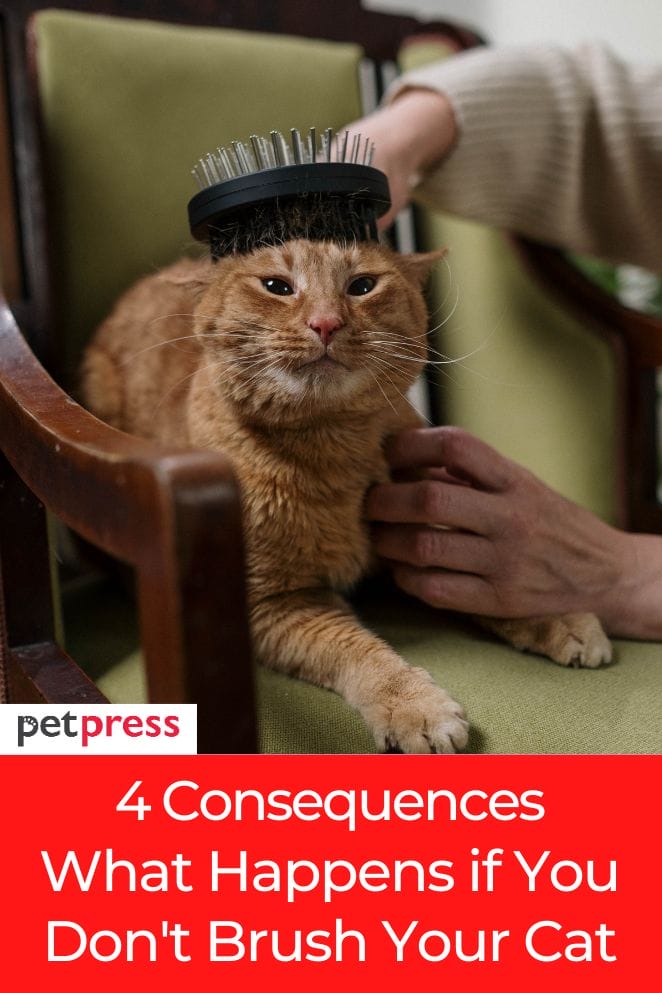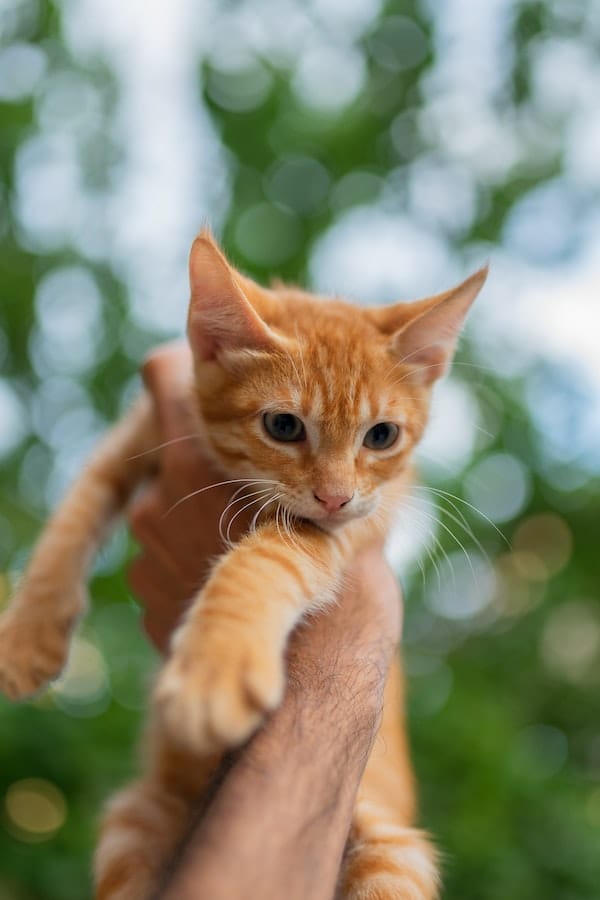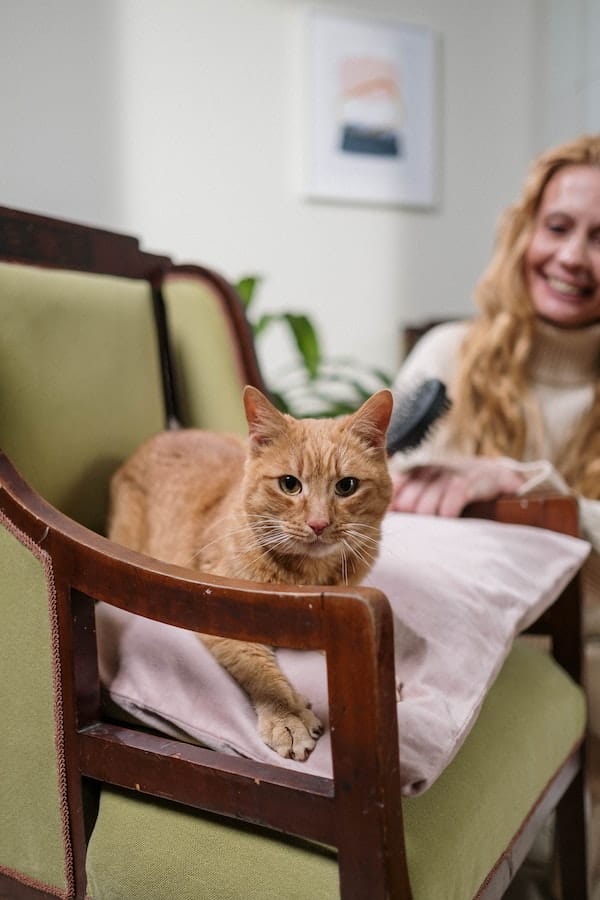
As a cat owner, it’s important to maintain your feline friend’s coat in addition to their impeccable grooming habits.
This blog post will cover the consequences of not brushing your cat, along with recommendations on how often and some tips to make brushing easier and enjoyable for you and your furry friend.
What happens if you don’t brush your cat?

Brushing your cat’s coat is an essential part of their grooming routine.
Not only does this help remove loose hair, dead skin, and dirt, but it also promotes a healthy coat and helps you bond with your pet.
Unfortunately, many people don’t brush their cats regularly or at all and this can lead to some serious consequences. These include:
Matting
Matting is one of the most common problems caused by not brushing your cat.
When a cat’s fur becomes matted, it means that the hairs have become tangled and knotted together.
This can be extremely uncomfortable for your pet and if left unbrushed, it can cause them to develop skin irritations or even sores that can become infected.
Excessive shedding
Cats are known for shedding, but when you don’t brush your cat regularly, this can increase the amount of hair that they shed.
This not only means more hair to vacuum up from your carpet and furniture, but it also means that your cat’s coat may not look as healthy and shiny.
Hairballs
If your cat isn’t brushed regularly, it may be more prone to developing hairballs.
When cats groom themselves, loose fur can become trapped in their stomachs which then forms into a ball-like structure known as a hairball.
This hair can accumulate in their stomachs and form hairballs, which can cause discomfort, vomiting, and even intestinal blockages in severe cases.
Skin problems
Cats that aren’t groomed regularly may also develop skin problems such as dryness, dandruff, or infection.
This is because the natural oils in their fur help to keep their skin healthy and when these oils are not replenished through regular brushing, the skin can become irritated or dry.
Furthermore, if your cat’s coat is not brushed regularly, dirt particles and bacteria can become trapped in their fur which could lead to infection.
How often should you brush your cat?

In order to ensure that your cat stays healthy and happy, it’s important to brush them regularly. But how often should you brush your cat?
The frequency of brushing depends on your cat’s coat type:
Short-haired cats
Short-haired cats typically need to be brushed less often than their long-haired counterparts.
However, this doesn’t mean that brushing is unnecessary; short-haired cats should still be brushed at least once a week in order to keep their coats healthy and free of tangles and dirt.
Long-haired cats
Long-haired cats need to be brushed more often than short-haired cats.
In order to keep their coats free of tangles and mats, they should be brushed at least three times a week.
Additionally, long-haired cats may require additional brushing during the shedding season in order to help remove loose fur.
Cats with special needs
Some cats may require more frequent grooming than others.
This includes cats with skin allergies or medical conditions such as arthritis, which can make it difficult for them to groom themselves adequately.
These cats should be brushed at least two to three times a week in order to help keep their coats free of tangles and dirt, as well as to help them maintain their skin health.
Tips for brushing your cat

Brushing can be a pleasant experience for both you and your cat if it is done in the right way. Here are some tips to make brushing easier:
Choose the right brush
When it comes to brushing your cat, not all brushes are created equal.
Different cats may require different types of brushes depending on their coat type.
For short-haired cats, a rubber brush or a slicker brush is usually best; for long-haired cats, an undercoat rake or pin brush should be used.
Start slowly and use positive reinforcement
It is important to start brushing your cat slowly.
Start by gently petting them with the brush and then gradually increase the amount of pressure you are using.
Give your pet plenty of praise and treats when they are being cooperative to encourage them to keep cooperating.
Be gentle
It is important to brush your cat gently. Avoid brushing too hard or too fast, as this can cause discomfort and even pain for your pet.
If you notice that your cat is becoming irritated, take a break and try again later.
Check for mats and tangles
When brushing your cat, it’s important to check for any mats or tangles in their fur. If you encounter any mats or tangles, use your fingers or a comb to gently work them out.
If they’re too severe, consult a professional groomer.
If you do find any, gently brush them out with the brush. If the mat is too tight to be brushed out, use a comb to tease it apart.
Make it a routine
Brushing your cat should be part of their regular grooming routine.
This not only helps keep their coat healthy and free of tangles, but it also helps you bond with your pet. Make sure that you brush them at least once a week and more often if necessary.
Conclusion
Brushing your cat is an essential part of their grooming routine and overall well-being.
By understanding the consequences of not brushing your cat and following the tips provided, you can ensure your feline friend stays healthy, comfortable, and looking their best.
Plus, it’s a great opportunity to bond with your pet and show them some extra love and attention. Happy brushing!


GIPHY App Key not set. Please check settings